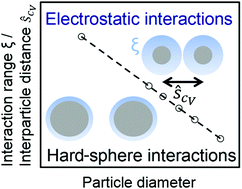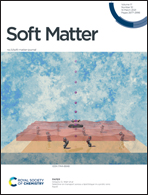Probing sedimentation non-ideality of particulate systems using analytical centrifugation†
Abstract
Analytical centrifugation is a versatile technique for the quantitative characterization of colloidal systems including colloidal stability. The recent developments in data acquisition and evaluation allow the accurate determination of particle size, shape anisotropy and particle density. High precision analytical centrifugation is in particular suited for the study of particle interactions and concentration-dependent sedimentation coefficients. We present a holistic approach for the quantitative determination of sedimentation non-ideality via analytical centrifugation for polydisperse, plain and amino-functionalized silica particles spanning over one order of magnitude in particle size between 100 nm and 1200 nm. These systems typically behave as neutral hard spheres as predicted by auxiliary lattice Boltzmann simulations. The extent of electrostatic interactions and their impact on sedimentation non-ideality can be quantified by the repulsion range, which is the ratio of the Debye length and the average interparticle distance. Experimental access to the repulsion range is provided through conductivity measurements. With the experimental repulsion range at hand, we estimate the effect of polydispersity on concentration-dependent sedimentation properties through a combination of lattice Boltzmann and Brownian dynamics simulations. Finally, we determine the concentration-dependent sedimentation properties of charge-stabilized, fluorescently-labeled silica particles with a nominal particle size of 30 nm and reduced interparticle distance, hence an elevated repulsion range. Overall, our results demonstrate how the influence of hard-sphere type and electrostatic interactions can be quantified when probing sedimentation non-ideality of particulate systems using analytical centrifugation even for systems exhibiting moderate sample heterogeneity and complex interactions.



 Please wait while we load your content...
Please wait while we load your content...